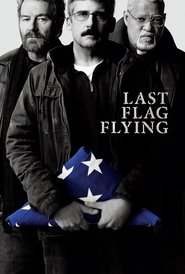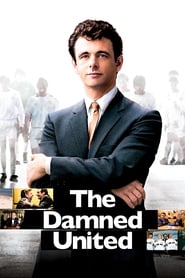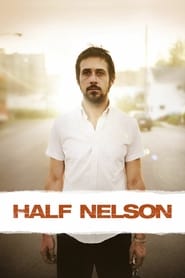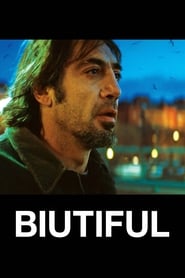|
|
|
Last Flag Flying (2017)
In the unlikely event of us making contact with an alien life form and the subsequent requirement to communicate what kind of species we are, sending up a Richard Linklater movie would probably be our best bet.
This is largely due to the fact that there are few better at capturing the broad spectrum of what it means to be human than the Texan director.
With Last Flag Flying, he continues his ongoing examination on the intricacies of humanity by following three Vietnam War veterans.
The three veterans Doc (Steve Carrell) , Sal ( Bryan Cranston) and Mueller ( Lawrence Fishbuene) make what is the prototypical buddy trio - something that does hold this film back slightly due to their dynamic resembling less of something organically humane, than something borne out of movie cliches.
The trio are on their way to pay their respects to Doc's son who was killed on duty in Afghanistan and upon knowing the true nature of his death - not along the battle lines, but in a humanitarian cause of delivering school books to children, Doc decides to bury his son himself rather than at Arlington and thus begins the difficult journey the three face while trying to do so.
This simple act of trying to bury one's child where one desires is extrapolated into an uncharacteristically funny by poignant commentary on war, manhood, age and grief as seen from the lens of three men that could only be described as that older relative that means well but can't help but be embarassing. Their antics include terrorist pranks, finding out that rapper Eminem is white and marvelling at mobile phones.
What's interesting to note is that Sal, the voice of humour in the movie is also often the first to voice out bitter truths about the past and present day life that the three have to accept. It's also him that is responsible for bringing the three to a almost cathartic moment in the later half of the film where they overcome a pending feeling of guilt over the past - albeit in the exact opposite way Sal intended them to.
While it may lack the emotional depth and organic human appeal of many of Linklater's previous films, Last Flag Flying still manages to build on its unofficial prequel The Last Detail, albeit marginally.
3/5
This is largely due to the fact that there are few better at capturing the broad spectrum of what it means to be human than the Texan director.
With Last Flag Flying, he continues his ongoing examination on the intricacies of humanity by following three Vietnam War veterans.
The three veterans Doc (Steve Carrell) , Sal ( Bryan Cranston) and Mueller ( Lawrence Fishbuene) make what is the prototypical buddy trio - something that does hold this film back slightly due to their dynamic resembling less of something organically humane, than something borne out of movie cliches.
The trio are on their way to pay their respects to Doc's son who was killed on duty in Afghanistan and upon knowing the true nature of his death - not along the battle lines, but in a humanitarian cause of delivering school books to children, Doc decides to bury his son himself rather than at Arlington and thus begins the difficult journey the three face while trying to do so.
This simple act of trying to bury one's child where one desires is extrapolated into an uncharacteristically funny by poignant commentary on war, manhood, age and grief as seen from the lens of three men that could only be described as that older relative that means well but can't help but be embarassing. Their antics include terrorist pranks, finding out that rapper Eminem is white and marvelling at mobile phones.
What's interesting to note is that Sal, the voice of humour in the movie is also often the first to voice out bitter truths about the past and present day life that the three have to accept. It's also him that is responsible for bringing the three to a almost cathartic moment in the later half of the film where they overcome a pending feeling of guilt over the past - albeit in the exact opposite way Sal intended them to.
While it may lack the emotional depth and organic human appeal of many of Linklater's previous films, Last Flag Flying still manages to build on its unofficial prequel The Last Detail, albeit marginally.
3/5
605 views
UNDO
0
|
|
|
|
|
Copenhagen
When Richard Linklater made Before Sunrise, he set forth the blueprint for fleeting tales of love set in stunning, exotic cities. It's a rough base for many films that have come since such as Cairo Time and Certified Copy - notwithstanding the two later installments to the 'Before' trilogy itself.
On the surface, Copenhagen seems like it continues in the same vein.
It involves two individuals exploring a city that happens to have transformed into a dreamscape tailor-made for the two, and there's a budding romance between the leads that is hampered by some facet holding them back from pursuing the inevitable.
You may think you know what to expect from Mark Raso's Copenhagen, but you don't.
For starters the lead - William, is quite possibly one of cinema's least likable leading men. He's in the city with his best friend Jeremy on the last leg of their trans-European trip. Copenhagen also happens to hold a special place for William as he's trying to track down his grandfather he'd never met. He has an envelope written by his father in Danish that he wants to deliver to his grandfather.
However when Jeremy's girlfriend comes along for the Copenhagen leg, William throws a fit. He is in all respects a man-child - someone who believes the world belongs to him and is entitled to what he wants. He's a petulant, selfish, impatient man who makes life hell for his best friend and his girlfriend.
When they've had enough of his antics, they leave - leaving William all to himself in this alien land to try and locate his grandfather. Well out of his depth, William meets Effy - a waitress at a restaurant he's at. Upon knowing the reason behind his visit, Effy agrees to help William and thus begins the uneasy romance between the two.
I say uneasy because Effy is a girl. Quite literally. She's about half William's age and is still in school.
The movie doesn't shy away from this fact. It revels in it. This is where this movie differentiates between other such similar meet-cute movies. There's an uneasy tension to it all - something you know shouldn't develop but when you can see it developing, you don't shy away. It draws you in.This uncomfortable romantic climate is what makes this movie so unique.
You could say that this girl and this boyish man are a great couple on the surface - they're both temperamentally similar. However that changes as the film goes on - the brash, infantile William starts to change - he starts becoming accountable for his actions. He doesn't lash out at whoever he sees. He understands why his father was never there for him and let's go of all the resentment held towards him. He doesn't seem all so entitled anymore. Simply put - he starts growing up.
This is great for him but heartbreaking for Effy as this brings any hope to a budding romance between the two to a halt.
What the film does do very well is transform Copenhagen into a city brimming with life - a city primed for adventure. It doubles up as a supporting feature for the film with Tivoli's bright gardens combining well with Copenhagen's seedy nightlife to provide the perfect setting for William's and Effy's story. However the most poignant scene in the film is reserved for the end - away from the city, in what can only be described as both a metaphorical and literal coalescence.
The film is a wonderfully complex look at life and love itself. It doesn't shy away from the many fuzzy boundaries that most films would like to gloss over. Copenhagen is a study on personal growth and how quite often it has to stem from within us - and while some people may come in and share in the experiences that stimulate that growth - it's still all dependent on ourselves.
3.5/5
On the surface, Copenhagen seems like it continues in the same vein.
It involves two individuals exploring a city that happens to have transformed into a dreamscape tailor-made for the two, and there's a budding romance between the leads that is hampered by some facet holding them back from pursuing the inevitable.
You may think you know what to expect from Mark Raso's Copenhagen, but you don't.
For starters the lead - William, is quite possibly one of cinema's least likable leading men. He's in the city with his best friend Jeremy on the last leg of their trans-European trip. Copenhagen also happens to hold a special place for William as he's trying to track down his grandfather he'd never met. He has an envelope written by his father in Danish that he wants to deliver to his grandfather.
However when Jeremy's girlfriend comes along for the Copenhagen leg, William throws a fit. He is in all respects a man-child - someone who believes the world belongs to him and is entitled to what he wants. He's a petulant, selfish, impatient man who makes life hell for his best friend and his girlfriend.
When they've had enough of his antics, they leave - leaving William all to himself in this alien land to try and locate his grandfather. Well out of his depth, William meets Effy - a waitress at a restaurant he's at. Upon knowing the reason behind his visit, Effy agrees to help William and thus begins the uneasy romance between the two.
I say uneasy because Effy is a girl. Quite literally. She's about half William's age and is still in school.
The movie doesn't shy away from this fact. It revels in it. This is where this movie differentiates between other such similar meet-cute movies. There's an uneasy tension to it all - something you know shouldn't develop but when you can see it developing, you don't shy away. It draws you in.This uncomfortable romantic climate is what makes this movie so unique.
You could say that this girl and this boyish man are a great couple on the surface - they're both temperamentally similar. However that changes as the film goes on - the brash, infantile William starts to change - he starts becoming accountable for his actions. He doesn't lash out at whoever he sees. He understands why his father was never there for him and let's go of all the resentment held towards him. He doesn't seem all so entitled anymore. Simply put - he starts growing up.
This is great for him but heartbreaking for Effy as this brings any hope to a budding romance between the two to a halt.
What the film does do very well is transform Copenhagen into a city brimming with life - a city primed for adventure. It doubles up as a supporting feature for the film with Tivoli's bright gardens combining well with Copenhagen's seedy nightlife to provide the perfect setting for William's and Effy's story. However the most poignant scene in the film is reserved for the end - away from the city, in what can only be described as both a metaphorical and literal coalescence.
The film is a wonderfully complex look at life and love itself. It doesn't shy away from the many fuzzy boundaries that most films would like to gloss over. Copenhagen is a study on personal growth and how quite often it has to stem from within us - and while some people may come in and share in the experiences that stimulate that growth - it's still all dependent on ourselves.
3.5/5
559 views
|
|
updated
|
The Damned United
The Damned United tells the story of treasured football manager Brian Clough's monumental failure in charge of the then-prolific Leeds United team.
In many ways, this would be an extremely odd topic to make a movie on. It's not about a success story as most sports movies are about. It's about a fall from grace. A failure by someone bound to succeed.
It's about a manager who defied all expectations with an unfancied team in Derby County and then got his big opportunity at a big club and absolutely bottled it.
While the film is about a football manager and a football team, it's scarcely about football. Instead it's a character piece and portrait of dangers of hubris.
It's about a man who felt he was too big to fail and then went on to do exactly that. In many ways it's a film that really showcases how football is a team game and no matter how talented you may be, without your team members, you're nothing - a sentiment Clough realised after his sacking and prompt apology to his former assistant Peter Taylor who he unceremoniously neglected when taking up the Leeds job.
Michael Sheen is marvellous as Clough - showcasing that swagger and arrogance the famous former footballer had when things were going well for him as well as the dejected figure of a man who's lost it all when he failed at Leeds.
3.5/5
In many ways, this would be an extremely odd topic to make a movie on. It's not about a success story as most sports movies are about. It's about a fall from grace. A failure by someone bound to succeed.
It's about a manager who defied all expectations with an unfancied team in Derby County and then got his big opportunity at a big club and absolutely bottled it.
While the film is about a football manager and a football team, it's scarcely about football. Instead it's a character piece and portrait of dangers of hubris.
It's about a man who felt he was too big to fail and then went on to do exactly that. In many ways it's a film that really showcases how football is a team game and no matter how talented you may be, without your team members, you're nothing - a sentiment Clough realised after his sacking and prompt apology to his former assistant Peter Taylor who he unceremoniously neglected when taking up the Leeds job.
Michael Sheen is marvellous as Clough - showcasing that swagger and arrogance the famous former footballer had when things were going well for him as well as the dejected figure of a man who's lost it all when he failed at Leeds.
3.5/5
594 views
|
|
updated
|
Half Nelson
Teachers are often said to hold the most humanitarian job the world has to offer. Indeed, they are in no small part responsible for raising the humans of tomorrow and teaching them the skills they need to survive life as they know it.
Sadly, it's also a profession that is taken for granted. In reality, it's a job that is, in most cases, unglamorous and underpaid.
But these teachers still do it. They bear all the troubles they face for the greater good of the world. In essence, they are the most selfless, caring and concerned people in the world. For their efforts alone, they are nearly faultless - they take troubled students on and set them on the right path.
Half Nelson contends with that notion however. Not with contending how selfless and draining the profession is, but with how teacher's aren't these faultless angelic creatures - they're humans, and as with any human, they have faults.
It also tries to depict the teacher-student dynamic as something of a dialogue rather than a monologue. It's a dynamic that is mutually affecting.
The film follows Dan (Ryan Gosling)- who on the surface may seem like the prototypical selfless instructor working in a lower income public school. He's a white man who tries to make class as engaging and relevant to his multi-racial class with a youthful connect that appears to be truly authentic - something that many teachers try but few master. Dan is that one teacher who the kids don't mind, dare I say like.
The film also focuses on Drey - a young, talented girl with some behavioural issues that stem from home - something that Dan tries to address and correct as any good teacher tries to do.
This sounds like the plot of every inspirational teacher-student drama Hollywood tries to plug.
But it's not.
Dan just happens to be a drug addict.
Here, the student is as instrumental in positively changing the teacher's life as the teacher is for the student's.
Through an unsettling encounter at the bathroom post a basketball game, Drey learns of Dan's issue, and the two build on that - not in an active, sappy sequence of events where they both try to help each other - they're not friends - they're teacher and student, there are boundaries they have to respect.
But they do impact each other in just the way they both want to, without ever overtly trying to. It's this understated, realistic beauty in the film's approach to teacher- student relations that makes this so special.
In what is one of Ryan Gosling's finest performances to date, creators Ryan Fleck and Anna Boden craft what is probably one of cinema's finest critiques on the notion of humans being viewed in binaries.
Half Nelson tries to show us as individuals - each with our own demons - trying just as hard as next one to live life to the best of our capacities.
Sadly, it's also a profession that is taken for granted. In reality, it's a job that is, in most cases, unglamorous and underpaid.
But these teachers still do it. They bear all the troubles they face for the greater good of the world. In essence, they are the most selfless, caring and concerned people in the world. For their efforts alone, they are nearly faultless - they take troubled students on and set them on the right path.
Half Nelson contends with that notion however. Not with contending how selfless and draining the profession is, but with how teacher's aren't these faultless angelic creatures - they're humans, and as with any human, they have faults.
It also tries to depict the teacher-student dynamic as something of a dialogue rather than a monologue. It's a dynamic that is mutually affecting.
The film follows Dan (Ryan Gosling)- who on the surface may seem like the prototypical selfless instructor working in a lower income public school. He's a white man who tries to make class as engaging and relevant to his multi-racial class with a youthful connect that appears to be truly authentic - something that many teachers try but few master. Dan is that one teacher who the kids don't mind, dare I say like.
The film also focuses on Drey - a young, talented girl with some behavioural issues that stem from home - something that Dan tries to address and correct as any good teacher tries to do.
This sounds like the plot of every inspirational teacher-student drama Hollywood tries to plug.
But it's not.
Dan just happens to be a drug addict.
Here, the student is as instrumental in positively changing the teacher's life as the teacher is for the student's.
Through an unsettling encounter at the bathroom post a basketball game, Drey learns of Dan's issue, and the two build on that - not in an active, sappy sequence of events where they both try to help each other - they're not friends - they're teacher and student, there are boundaries they have to respect.
But they do impact each other in just the way they both want to, without ever overtly trying to. It's this understated, realistic beauty in the film's approach to teacher- student relations that makes this so special.
In what is one of Ryan Gosling's finest performances to date, creators Ryan Fleck and Anna Boden craft what is probably one of cinema's finest critiques on the notion of humans being viewed in binaries.
Half Nelson tries to show us as individuals - each with our own demons - trying just as hard as next one to live life to the best of our capacities.
625 views
|
|
updated
|
About Schmidt
About Schmidt, as the title suggests, is about a man named Warren Schmidt.
In ways, Schmidt is the equivalent of the colour beige - there's absolutely nothing noteworthy about him. He is more than happy to simply live his life as it passes him by.
We join Schmidt on his retirement day which now leaves him with nothing to do at home. He is a man with no purpose or meaning. He feels alienated from his wife who he no longer recognises and has grown to loathe.
In what might be the single most noteworthy event of Schmidt's life to that point - his wife collapses dead. This invigorates Schmidt enough to get on his new Winnebago and meet his daughter who is to be married.
In ways she is the polar opposite of Schmidt and possesses a certain joie de vivre. The same can be said about her in laws - her mother in law in particular. An understated hilarity naturally ensues when the human embodiment of beige is forced into a rainbow coloured environment.
While About Schmidt could have easily turned out to be a film about a man on a road trip that changes his life and personality all together, it is far more conservative in its approach. Schmidt is unlikely to skydive or go on safaris out of some sudden desire to live life to its fullest.
However, he does learn to live. Albeit in a quiet sedate manner. In what was once a man defined by his job and others around him, we now find a man. A man of no note whatsover - quite comfortable in his own skin - but an individual nonetheless - not a creation of his surroundings.
Featuring Jack Nicholson in what is probably his only age appropriate role to date, About Schmidt is writer-director Alexander Payne at his quietly humourous and poignant best.
3.5/5
In ways, Schmidt is the equivalent of the colour beige - there's absolutely nothing noteworthy about him. He is more than happy to simply live his life as it passes him by.
We join Schmidt on his retirement day which now leaves him with nothing to do at home. He is a man with no purpose or meaning. He feels alienated from his wife who he no longer recognises and has grown to loathe.
In what might be the single most noteworthy event of Schmidt's life to that point - his wife collapses dead. This invigorates Schmidt enough to get on his new Winnebago and meet his daughter who is to be married.
In ways she is the polar opposite of Schmidt and possesses a certain joie de vivre. The same can be said about her in laws - her mother in law in particular. An understated hilarity naturally ensues when the human embodiment of beige is forced into a rainbow coloured environment.
While About Schmidt could have easily turned out to be a film about a man on a road trip that changes his life and personality all together, it is far more conservative in its approach. Schmidt is unlikely to skydive or go on safaris out of some sudden desire to live life to its fullest.
However, he does learn to live. Albeit in a quiet sedate manner. In what was once a man defined by his job and others around him, we now find a man. A man of no note whatsover - quite comfortable in his own skin - but an individual nonetheless - not a creation of his surroundings.
Featuring Jack Nicholson in what is probably his only age appropriate role to date, About Schmidt is writer-director Alexander Payne at his quietly humourous and poignant best.
3.5/5
613 views
251425251424251423251421251422251258251257251256251255251254









